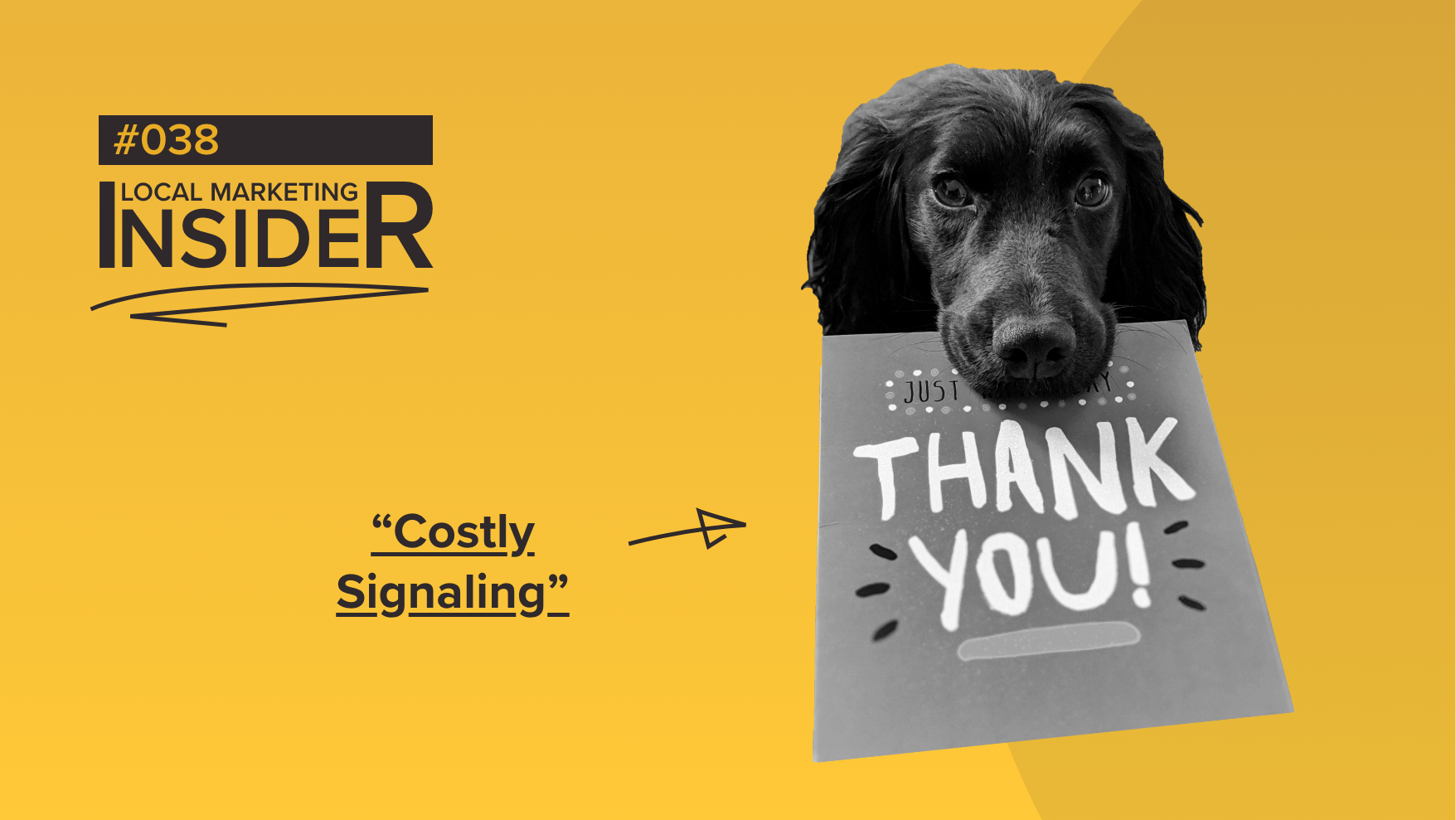- Solutions
- Resources
- Pricing
- Company
Today's issue is about the psychological principle of costly signals. How costliness carries meaning when attracting new partners/clients/customers, and how there are in fact two types of costly signals: those that differentiate and those that are a competitive necessity.

Part 1 - Differentiation
Companies, like individuals and the natural world, need to attract partners to survive. They need customers, employees, investors, suppliers, resellers - and the fittest come out ahead.
We all have limited resources available for partners (one CRM, one supplier of important material, etc.), which naturally creates competition. And within this world of pressure, competition and high stakes we have to choose our alliances with incomplete information and limited time and energy to decide.
At the beginning of a relationship, it's hard to know if a partner will deliver on its promises. To give us clues we rely on external, often visual, surface-level signals to make decisions.
Usually, for the business, these clues are expensive or costly to attain: standout design, beautiful storefront, expert landscaping.
Companies invest in costly things to show their “fitness” as a partner. Costliness carries meaning.
This is commonly known in the psychology world as a “costly signal.”
A great example of a costly signal is the manner in which you deliver a message.
As Rory Sutherland, the legendary copywriter, puts it: “The meaning and significance we attach to something is felt in direct proportion to the expense in which it is communicated.”
The amount of time and effort one applies to a message can be considered an expense.
In my early days at Widewail, one of Matt’s (CEO, aka my boss) marketing directives to me was to “make Widewail look bigger than it is.” We needed to appear premium to increase our attractiveness to potential buyers.
For me, given my skills, that meant getting to work on a well-designed brand (and later, this newsletter). Our focus has expanded as the marketing team has grown.
Part 2 - Competitive necessity
While the concepts of a “costly signal” and “premium appearance” are important in differentiating your business from competitors, you also need to employ similar tactics to stay relevant with the same group.
When it comes to spending on appearance, remember that perception is entirely context-dependent.
The value of costly signals changes over time, based on technology, economics, and for local businesses, changing local competition and local market conditions.
Put another way, signaling is a relative task.
Meaning your 4.5 Google rating is only good if your competitor down the street has a 4.4 or less.
The nature of a relative task is that in the real world, competitive businesses will be constantly improving. You’ll need to expend resources to simply keep up.
What worked for the PGA Tour for almost 100 years is suddenly thrown into question with LIV Golf on the scene.
In order to maintain a certain level of success as a business, you always need to be improving.
So the answer is yes. You do need to dress to impress.
In some cases, costly signals will set your business apart and in others, the investment will simply be to maintain your relevance with the rest of the pack.
Which costly signals are you prioritizing?
Brief observations: if we consider reviews a costly signal
Watching the reviews industry so closely, we’ve noticed each industry's reputation management maturity impacts whether reviews are considered a differentiator or a competitive necessity.
Anecdotally, car dealers' review programs are years ahead of hospitality, for example.
Lately, we’ve noticed more interest from the property management industry, and the adoption of public feedback (and its marketing benefits) in addition to internal surveys is becoming more widely prioritized.
All things being relative, where in auto great review content may be a costly signal needed to keep up with the status quo, in hospitality and property management the same content will set your business apart, its value being differentiation.
A note of appreciation to the Divinations Newsletter where much of the inspiration for this article originated. Nathan, the author expands on the topic of this article, introducing the concept of "vibe shifts" which is equal parts fascinating and a tool you can use to predict future trends.
New this week, we've added a link to Release Notes, where you can find monthly updates on Widewail product developments.
Widewail is coming up on its 4th anniversary and to celebrate Matt recorded a video on the top 4 things he's learned as a first-time founder. We'll be putting that video up on Linkedin tomorrow. Follow along on Linkedin.
See you in 2 weeks - Jake, Marketing @Widewail

How multi-location local business groups can get started with Trust Marketing
"Trust Marketing" is a fairly new concept, but we would argue is fundamentally part of each local business's DNA. Capturing and sharing the words of customers is an influential way to build trust with prospects in today's world (and as a result grow your business). Matt explains in more detail what a Trust Marketing strategy can mean for larger local business groups and how to get started implementing a strategy.
I’m the Director of Marketing here at Widewail, as well as a husband and new dad outside the office. I'm in Vermont by way of Boston, where I grew the CarGurus YouTube channel from 0 to 100k subscribers. I love the outdoors and hate to be hot, so I’m doing just fine in the arctic Vermont we call home. Fun fact: I met my wife on the shuttle bus at Baltimore airport. Thanks for reading Widewail’s content!
Bite-sized, to-the-point, trend-driven local marketing stories and tactics.
U3GM Blog Post Comments